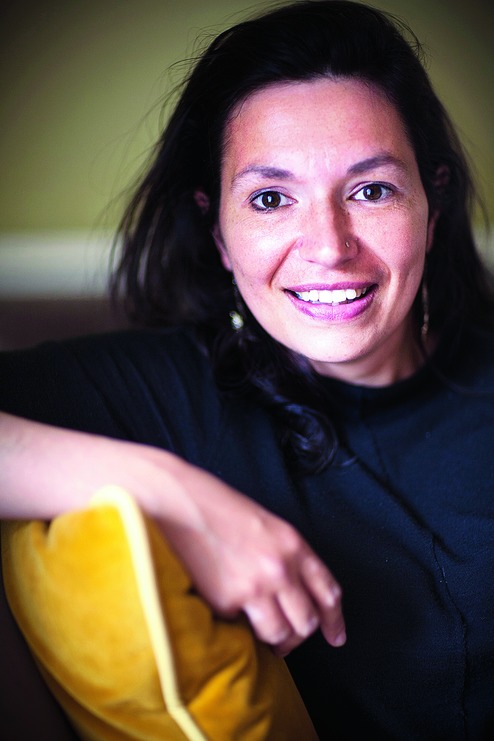Oxford historian dispels 'myth' of lone Britain

Yasmin Khan, associate professor of History at Oxford, is making quite a name for herself.
When the BBC's Newsnight did a special programme on Partition, she appeared on a panel alongside fellow historian Joya Chatterji of Cambridge and author Alex von Tunzelmann - the three women managed to upset conservative male newspaper commentators who reject the notion that Britain was in any way to blame for the holocaust triggered by hastily "drawing a line" across Punjab and Bengal.
Yasmin also caused a stir with a recent article in The New York Times, which sought to dispel the "myth" that Britain was a plucky island nation that fought fascism and the Nazis without any help from Indian and other troops.
She begins by pointing out: "Two and a half million soldiers drawn from Britain's empire in South Asia fought in World War II. But they are missing from many British commemorations and accounts of the war - an absence reinforced by Christopher Nolan's new film Dunkirk, which does not feature any of the Indian soldiers who were present at the battle."
She argues: "The focus on Britain 'standing alone' sometimes risks diminishing how the war brought pain in many places, right across the globe... Above all, the narrative of a plucky island nation beating back the Germans omits the imperial dimension of the war."
The crucial role played by India is set out in detail in her widely praised book, The Raj at War, right in the very prologue: "Britain did not fight the Second World War, the British Empire did."
Yasmin, herself the granddaughter of a British army officer whose daughter married a Pakistani, says: "Generations of British schoolchildren, including me, sat through history lessons about World War II and never heard about the connection to Asia. British South Asians have only tentatively started to see their own place in this 'British' story."
Yasmin, who was born in London in the 1970s, strongly believes that "British history at school needs more global and imperial dimensions; students want to know about it, too, and there are lots of amazing teachers trying to bring it more onto the curriculum".
Rushdie reveals
• Sir Salman Rushdie, whose Midnight’s Children has been dramatised by BBC Radio 4, has given one of his most revealing interviews about the genesis
of the novel.
Rushdie, who also turned 70 this year, was born in Bombay on June 19, 1947.
"I am older - eight weeks to the day," he told Emma Harding, one of the drama's directors.
"I just thought to myself what would it be like if the eight week gap were not there - if it was actually the same day," he went on.
When he began the novel in third person, the writing "was oddly dead on the page", admitted Rushdie.
So he said, "Let me just see what happens if I let him (Saleem Sinai) talk - and once he started talking it was quite clear I couldn't shut him up. It was a very exciting voice to discover."
Dal chawal

• Calcutta boy Sundeep Bhutoria, whose Prabhat Khaitan Foundation helps promotes regional and translated Indian authors and personalities under his innovative Author's Afternoon, Kalam and Ek Mulakat banners, is in the UK, where he is especially keen to promote Hindi writers.
Sundeep has just signed a collaboration agreement with the British Council, which, incidentally, marks the 70th year of its establishment in India next year.
Sundeep, who has been taking in the Edinburgh Festival, travels constantly but over dinner at Quilon (where the rasam is to my mind the best in town), he confides: "At the end of the day I have to have dal chawal."
When I ask for his top 10 Indian restaurants in the world, Sundeep, a vegetarian, sends me his personal selection: Le Taj (Montreal); Indego by Vineet (Dubai); Rang Mahal at Rembrandt Hotel (Bangkok); Indian Taj (Copenhagen); Bombay Brasserie (London); The Taj Pavilion (Beijing); Redfort (Xian China); Punjab Grill (Singapore); Junoon (New York); and Taj Campton Place (San Francisco).
Tittle tattle

• Calcutta style phuchka is being deployed to good effect to bring India and Sweden closer. At the recent Stockholm Cultural Festival, phuchka was available as an example of Indian street food.
Phuchka, I am happy to report, was also served as a starter at the India @ 70 Gala Dinner, which was hosted by Indian ambassador Monika Mohta, Air India (which has started direct flights between Stockholm and New Delhi) and an organisation called India Unlimited.
Swedish ministers and other distinguished guests "looked at the round balls but were not sure what to do," India Unlimited's chief executive director, Sanjoo Malhotra, tells me.
He manfully stepped up on stage and demonstrated with phuchka and tangy liquid how the deed is done - all in the cause of India-Sweden friendship.










